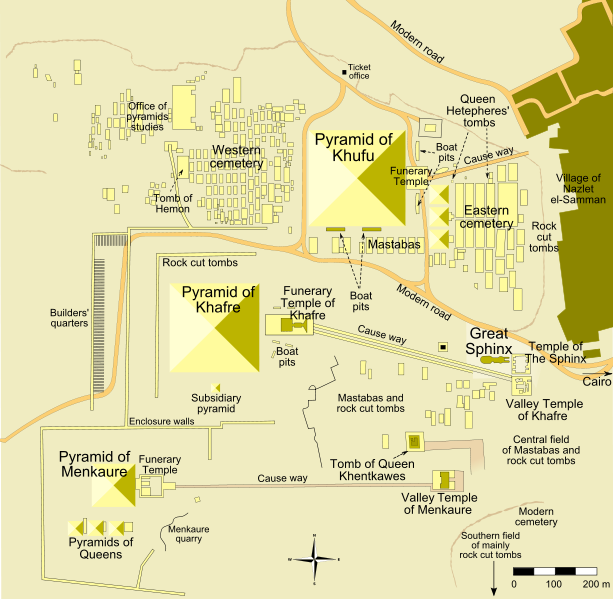Page 1 of 1
Ra and his Solar boat
Posted: Sat Aug 04, 2012 4:28 pm
by neufer
http://en.wikipedia.org/wiki/Ra wrote:
<<Ra or Re is the ancient Egyptian sun god. By the Fifth Dynasty (2494 to 2345 BC.) he had become a major deity in ancient Egyptian religion, identified primarily with the midday sun. The meaning of the name is uncertain, but it is thought that if not a word for 'sun' it may be a variant of or linked to words meaning 'creative power' and 'creator'.
The chief cult centre of Ra was Heliopolis (called Iunu, "Place of Pillars", in Egyptian), where he was identified with the local sun-god Atum. Through Atum, or as Atum-Ra he was also seen as the first being and the originator of the Ennead, consisting of Shu and Tefnut, Geb and Nut, Osiris, Set, Isis and Nephthys.
Ra was thought to travel on two solar boats called the Mandjet (the Boat of Millions of Years), or morning boat and the Mesektet, or evening boat. These boats took him on his journey through the sky and the underworld. When Ra traveled in his sun boat he was accompanied by various other deities including Sia (perception) and Hu (command) as well as Heka (magic power). Sometimes members of the Ennead helped him on his journey, including Set who overcame the serpent Apophis and Mehen who defended against the monsters of the underworld.
Apophis, an enormous serpent tried to stop the sun boat's journey every night by consuming it or by stopping it in its tracks with a hypnotic stare. In the evening the Egyptians believed that Ra set as Atum or in the form of a ram. The Mesektet or Night boat would carry him through the underworld and back towards the east in preparation for his rebirth. These myths of Ra represent the sunrise as the rebirth of the sun by the sky.>>
http://asterisk.apod.com/viewtopic.php? ... 66#p180861
http://asterisk.apod.com/viewtopic.php? ... 66#p180872
http://garyosborn.webs.com/thepoussincodept2.htm
The following was true
both in 10,700 BC
AND 2550 BC (as it is true today):
N <=> S
Alnilam to Alnitak: ~ 45º NW => SE vis-a-vis annual Ra celestial W => E ecliptic solar path.
Khafre (2532? BC) to Khufu (2560 BC): ~ 45º SW => NE vis-a-vis daily Ra underground W => E solar path.
Alnitak: ~ 25.3º S of annual Ra celestial W => E solar path. (i.e., 25.3º S of Ecliptic)
Khufu: ~ 25.3º N of daily Ra underground W => E solar path
12 days before autumnal equinox
(i.e., 30º N of celestial equator)
http://en.wikipedia.org/wiki/Shemu wrote:
<<Season of the Harvest (known in Egyptian as Shemu or Shomu) is the third and final season of the Egyptian calendar. The word Shemu literally translates as "low-water", and falls roughly
between early May and early September. The months of the lunar calendar are roughly equivalent to the period from early May to
the heliacal rising of Sirius around the beginning of September.>>
Re: Ra and his Solar boat
Posted: Sun Aug 05, 2012 3:31 am
by Beyond
Lets hear it for the solar boat! Rah, Rah!!
Re: Ra and his Solar boat
Posted: Sun Aug 05, 2012 4:46 am
by Ann
Art, you mean that those pyramids are laid out on the ground in the same way as the three stars of Orion's Belt are "laid out" in the sky? And the pyramids are laid out so that they point out north and south to you, and aspects of the Sun can also be discerned from them?
That's really fascinating. These people worshipped Rah, the sun-god, and they paid tribute to him by emulating Oion's Belt in the sky.
Ann
Re: Ra and his Solar boat
Posted: Sun Aug 05, 2012 12:54 pm
by neufer
Ann wrote:
Art, you mean that those pyramids are laid out on the ground in the same way as the three stars of Orion's Belt are "laid out" in the sky? And the pyramids are laid out so that they point out north and south to you, and aspects of the Sun can also be discerned from them?
That's really fascinating. These people worshipped Rah, the sun-god, and they paid tribute to him by emulating Orion's Belt in the sky.
Early tall buildings (e.g., Pyramids, cathedrals,
ziggurats,
Macchu Picchu, Tower of Babel?, ...) might very well be intended to be closer to the sun, planets or stars. (For better "
Mt. Sinai" reception? : "Can you hear me now?").
And giant ground patterns (e.g.,
Leucippotomy,
Gigantotomy,
Nazca Lines, ...) might very well be intended to send a pictogram/hieroglyphic message back to the constellations.
Or they might not

Re: Ra and his Solar boat
Posted: Sun Aug 05, 2012 1:06 pm
by rstevenson
Ra, Ra, Ra your boat.
Gently down the [Milky Way]?
Rob
Re: Ra and his Solar boat
Posted: Sun Aug 05, 2012 3:03 pm
by Chris Peterson
Ann wrote:Art, you mean that those pyramids are laid out on the ground in the same way as the three stars of Orion's Belt are "laid out" in the sky? And the pyramids are laid out so that they point out north and south to you, and aspects of the Sun can also be discerned from them?
It's not impossible, but it's extremely unlikely. There are quite a few scholarly papers discussing the possible alignments of various Old Kingdom Egyptian architecture. I'm not aware of any which take the position that the pyramids are laid out in a mapping of Orion's belt.
It makes about as much sense to take this idea seriously as to suggest... I don't know, that Shakespeare didn't write Hamlet?
Re: Ra and his Solar boat
Posted: Sun Aug 05, 2012 4:47 pm
by neufer
Chris Peterson wrote:Ann wrote:
Art, you mean that those pyramids are laid out on the ground in the same way as the three stars of Orion's Belt are "laid out" in the sky? And the pyramids are laid out so that they point out north and south to you, and aspects of the Sun can also be discerned from them?
It makes about as much sense to take this idea seriously as to suggest...
I don't know, that Shakespeare didn't write Hamlet?
- Damn right

http://en.wikipedia.org/wiki/Hamlet wrote:
<<
Scholars have often speculated that Hamlet's Polonius might have been inspired by William Cecil (Lord Burghley)—Lord High Treasurer and chief counsellor to Queen Elizabeth I. E. K. Chambers suggested Polonius's advice to Laertes may have echoed Burghley's to his son Robert Cecil. John Dover Wilson thought it almost certain that the figure of Polonius caricatured Burleigh, while A. L. Rowse speculated that Polonius's tedious verbosity might have resembled Burghley's. Lilian Winstanley thought the name Corambis (in the First Quarto) did suggest Cecil and Burghley.
Perturbed by Hamlet's continuing deep mourning for his father and his increasingly erratic behaviour, Claudius sends for two of Hamlet's acquaintances—Rosencrantz and Guildenstern—to find out the cause of Hamlet's changed behaviour. Hamlet greets his friends warmly but quickly discerns that
they have been sent to spy on him. An argument erupts between Hamlet and Gertrude. Polonius, spying on the scene from behind an arras and convinced that the prince's madness is indeed real, panics when it seems as if Hamlet is about to murder the Queen and cries out for help. Hamlet, believing it is Claudius hiding behind the arras, stabs wildly through the cloth, killing Polonius.>>
http://www.elizabethan-era.org.uk/william-cecil-lord-burghley.htm wrote:
<<
Lord Burghley (a.k.a., Polonius) and Sir Francis Walsingham devised an intricate spy network during the latter years of Elizabeth's reign that succeeded in uncovering the Babington Plot of 1586. [William Cecil's] nephew was Francis Bacon.
His daughter Anne married Edward De Vere. His second son, Robert Cecil followed in his father's footsteps and became advisor to Queen Elizabeth>>
http://www.corvalliscommunitypages.com/Europe/england/edward_de_vere_as_william_shakes.htm wrote:
<<
In 1567, when he was 17, while practicing fencing at Cecil's mansion, de Vere wounded an unarmed undercook named Thomas Brincknell with a thrust to his thigh. The man died the next day. Cecil apparently packed the jury which determined that Brincknell caused his own death by wilfully hurling himself on de Vere's rapier. Apparently the man was drunk at the time.
It's known that Cecil had a network of spies and it's been suggested that the man was spying on de Vere for Cecil. The unfortunate result was that the man's death was adjudged suicide which meant de Vere was free of charges but the man was denied Christian burial.">>
http://www.usiranaffairs.com/?p=2646 wrote:
How British spies turned Nazis into D-Day dupes.
David Ignatius, Washington Post, August 5, 2012
<<
Is there any nation on Earth more adept at lying than Great Britain? Reading Ben Macintyre’s superb account of Britain’s masterful counter-intelligence operations during World War II, it’s hard to imagine that they have any peers when it comes to the Art of deception. In “Double Cross,” Macintryre tells a tale that will be broadly familiar to those with an interest in military or intelligence history. But he does so with such lively writing, and with access to so many interesting new documents, that the story comes alive again in all its stupendous, unimaginable duplicity.The Brits, in brief, managed to control and manipulate every single German agent sent to Britain to spy on the Allies and their preparations for the decisive June 1944 D-Day invasion. Not only did the British flip or neutralize every Nazi operative, they were able to assess the success of their deception every step of the way by monitoring Germany’s encrypted intelligence messages. On these two pillars of Britain’s wartime intelligence success – the “Double Cross” deception and the “Enigma” code break – stands, at least in part, the great Allied victory in Europe.>>


